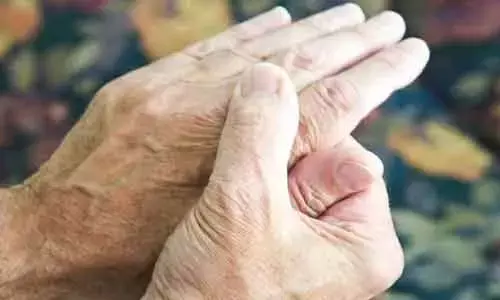- Home
- Medical news & Guidelines
- Anesthesiology
- Cardiology and CTVS
- Critical Care
- Dentistry
- Dermatology
- Diabetes and Endocrinology
- ENT
- Gastroenterology
- Medicine
- Nephrology
- Neurology
- Obstretics-Gynaecology
- Oncology
- Ophthalmology
- Orthopaedics
- Pediatrics-Neonatology
- Psychiatry
- Pulmonology
- Radiology
- Surgery
- Urology
- Laboratory Medicine
- Diet
- Nursing
- Paramedical
- Physiotherapy
- Health news
- Fact Check
- Bone Health Fact Check
- Brain Health Fact Check
- Cancer Related Fact Check
- Child Care Fact Check
- Dental and oral health fact check
- Diabetes and metabolic health fact check
- Diet and Nutrition Fact Check
- Eye and ENT Care Fact Check
- Fitness fact check
- Gut health fact check
- Heart health fact check
- Kidney health fact check
- Medical education fact check
- Men's health fact check
- Respiratory fact check
- Skin and hair care fact check
- Vaccine and Immunization fact check
- Women's health fact check
- AYUSH
- State News
- Andaman and Nicobar Islands
- Andhra Pradesh
- Arunachal Pradesh
- Assam
- Bihar
- Chandigarh
- Chattisgarh
- Dadra and Nagar Haveli
- Daman and Diu
- Delhi
- Goa
- Gujarat
- Haryana
- Himachal Pradesh
- Jammu & Kashmir
- Jharkhand
- Karnataka
- Kerala
- Ladakh
- Lakshadweep
- Madhya Pradesh
- Maharashtra
- Manipur
- Meghalaya
- Mizoram
- Nagaland
- Odisha
- Puducherry
- Punjab
- Rajasthan
- Sikkim
- Tamil Nadu
- Telangana
- Tripura
- Uttar Pradesh
- Uttrakhand
- West Bengal
- Medical Education
- Industry
RA patients at higher risk of death, rehospitalization after heart attack: Study

Finland: Rheumatoid arthritis (RA) patients are at a higher risk for long-term poor outcomes following a heart attack (myocardial infarction), a recent study in the journal Rheumatology has revealed.
Antti Palomäki, Department of Medicine, University of Turku, Turku, Finland, and colleagues aimed to investigate the long-term outcomes of patients with rheumatoid arthritis (RA) after myocardial infarction (MI).
For the purpose, the researchers conducted a multicenter, nationwide, cohort register study in Finland. They retrospectively compared all-comer, real-life MI patients with RA (n = 1614, mean age 74 years) to propensity score (1:5) matched MI patients without RA (n = 8070).
The impact of RA duration and the usage of corticosteroids and antirheumatic drugs on RA patients' outcomes were also studied. The median follow-up was 7.3 years.
Key findings of the study include:
- RA was associated with an increased 14-year mortality risk after MI compared to patients without RA (80.4% vs. 72.3%; HR 1.25).
- Patients with RA were at higher risk of new MI (HR 1.22) and revascularisation (HR 1.28) after discharge from index MI.
- Cumulative stroke rate after MI did not differ between RA and non-RA patients.
- RA duration and corticosteroid usage before MI, but not use of methotrexate or biologic antirheumatic drugs, were independently associated with higher mortality and new MI.
- A higher dosage of corticosteroids prior to MI was independently associated with higher long-term mortality and methotrexate usage with lower stroke rate.
- Serological status of RA was not associated with outcomes.
"RA is independently associated with poorer prognosis after MI. RA duration and corticosteroid usage and dosage were independent predictors of mortality after MI in RA," wrote the authors. "Special attention is needed for improvement of outcomes after MI in this vulnerable population."
The study titled, "Patients with rheumatoid arthritis have impaired long-term outcomes after myocardial infarction – a nationwide case-control registry study," is published in the journal Rheumatology.
DOI: https://academic.oup.com/rheumatology/advance-article/doi/10.1093/rheumatology/keab204/6154670
Dr Kamal Kant Kohli-MBBS, DTCD- a chest specialist with more than 30 years of practice and a flair for writing clinical articles, Dr Kamal Kant Kohli joined Medical Dialogues as a Chief Editor of Medical News. Besides writing articles, as an editor, he proofreads and verifies all the medical content published on Medical Dialogues including those coming from journals, studies,medical conferences,guidelines etc. Email: drkohli@medicaldialogues.in. Contact no. 011-43720751


